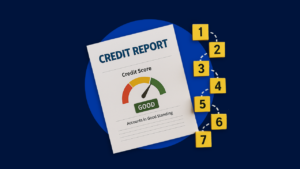How long does debt relief stay on your credit report?

Financial strain can happen anytime, leaving you needing help to deal with your financial commitments. While there are several options for debt relief, it’s important to know that some of these can stick around a lot longer on your credit report than anticipated. For instance, certain types of bankruptcy can stay on your credit report for up to 10 years
Not all types of financial relief may even appear on your credit report, let alone affect it for an overly long period. It’s best to examine each option to discover its benefits and pitfalls, including how long it remains on a credit report.
How debt relief impacts your credit
When weighing debt relief options, consider whether your chosen means of relief will impact your credit report. Some choices may only affect your score for a few months, while others may appear on your report for several years.
Debt settlement
Duration on your report: Debt settlement can stay on your report for up to seven years.
Debt settlement occurs when a company contacts creditors and negotiates a settlement on your behalf. The debt settlement company may ask you to stop paying your creditors and instead pay an amount into a separate account. From there, the debt settlement company will allocate payments to your creditors.
You may receive lowered monthly payments and settle the debt for less than you owe. However, debt settlement leaves a negative mark on your credit report because you’re changing the terms of the original agreement.
In many instances, the financial institution loses out on a portion of the repayments—capital outstanding and possibly interest. That reflects poorly on the payer, which could affect future opportunities with other creditors.
Some creditors may not wish to work with the chosen debt settlement company. If the debt settlement company asks you to stop making payments on your credit cards, you may also experience a sharp drop in your credit score. You would have the debt settlement on your credit report, plus the missed payments on your credit cards.
Debt settlement companies may also charge a hefty fee. Check whether these companies are in good standing. Bogus debt settlement companies often contact clients directly or require an upfront fee. Neither of these practices is allowed under the Telemarketing Sales Rule.
Ways to check whether debt settlement companies are legitimate include:
- Online reviews and customer experiences
- Their standing with the Better Business Bureau (BBB)
- Whether they’re registered with the American Association for Debt Resolution (AADR) or the International Association of Professional Debt Arbitrators (IAFPDA)
A debt management plan or credit counseling
Duration on your report: Debt management plans don’t get noted at the credit bureaus, but you might see a drop in your score for a few months as you close accounts.
When you opt for a debt management plan, you’ll work with a credit counselor representing a credit counseling organization. A credit counselor will help you create a budget and repayment plan to get out of debt. Once this is done, they’ll approach your creditors and attempt to negotiate better fees or interest rates.
Your credit score may drop briefly as the counseling includes closing off accounts you no longer need. This could affect your credit mix and debt ratios.
Debt counseling involves creating a financial plan to maximize income and help you get out of debt.
During the credit counseling period, creditors won’t allow you to open additional credit or use credit lines that fall within the scope of the debt management plan. Credit counselors only deal with unsecured debt, such as credit cards and personal loans. If you’re struggling with your mortgage or auto loan repayments, you need to make another arrangement for those separately.
Your payments go to the debt counseling agency, which then makes payments to your creditors. It’s worth knowing that your credit score might only experience a temporary drop as you close accounts. You’re repaying the full outstanding balance, which reflects much better on your credit report than settling debt at a lower amount.
Your credit score should improve because you’re making regular payments toward your debt.
Bankruptcy
Bankruptcy is a serious financial decision with a long-term impact on your credit report. You should only consider bankruptcy if you’ve ruled out all other avenues. W
hen you’re facing serious financial problems such as loss of income or lawsuits from creditors and you’re at risk of foreclosure, bankruptcy may offer some protection.
There are two types of bankruptcy: Chapter 7 and Chapter 13.
Chapter 7
Duration on your credit report: 10 years
This type of bankruptcy, also known as a straight or liquidation bankruptcy, involves selling off your assets. Once you’ve done this, the remaining debt is usually discharged, and creditors may no longer ask for payment.
To qualify for Chapter 7, you must prove your financial distress through a means test.
Chapter 13
Duration on your credit report: Seven years
With this type of bankruptcy, you keep your assets, but you must repay the debt. A bankruptcy attorney will help you structure some or all of your debt repayments over three to five years.
Some debts, including taxes and child support, aren’t discharged when you file for bankruptcy.
Debt consolidation
Duration on your credit report: Debt consolidation appears as a normal loan or credit card. The initial dip in the credit score may only last a few months.
Debt consolidation is a loan in the form of a lump sum that repays all of your smaller debt. Instead of paying several creditors, a consolidation loan streamlines your payments into one. This is helpful if your cash flow becomes difficult to manage.
A consolidation loan is considered new debt, which means your credit score will temporarily dip. If you keep to the repayments and close all the smaller debt items, you can increase your credit score again.
While you might pay a lower monthly installment, you might extend the term of your debt and end up paying more in the long run. If you plan on debt consolidation, shop around for a good interest rate and low fees. One option is to transfer your debt to a 0 percent balance-transfer card and pay off the debt before the end of the interest-free period.
How to remove settled accounts from credit reports
Once you’ve settled an account, the lender typically advises the bureaus that the account is now settled.
If this is not the case, you can send a settlement letter to relevant credit bureaus to update the information:
Although you typically can’t remove accounts from your credit report, you can ask them to remove derogatory information or code account closures under a different reason. You can also ask your bank to report a different account status with a letter of goodwill. You can also get help from a credit repair company.
How to improve your credit score after debt relief
Once you’ve worked through the debt relief process, you might notice a slight dip in your score. However, it’s still possible to improve your score:
- Check your credit reports. The best way to improve your score is to check, monitor and take action when you notice something is amiss. Several credit check apps allow you to check your score for free without affecting your score. Monitor your report for correct and up-to-date information and report suspicious behavior immediately.
- Consider credit products that help build your score. Some credit products are designed to help you improve your score. These include secured credit cards, credit cards for bad credit and credit builder loans. These loans are usually small, and some require a security deposit. Paying on time and in full will help you build your score.
- Honor your credit agreements. Pay the amount due by the due date, as late or partial payments will usually be reported to the credit bureaus.
- Keep your credit utilization rate low. Your utilization rate shows whether you’re using your credit products to the max. To increase your credit score and appear more favorable to lenders, reduce your spending to keep your utilization rate under 30%.
- Keep your old accounts open. If you have older accounts in good standing, keep them open. Longevity works in your favor, especially if your utilization rate is low.
Next steps
Debt relief might help you out of a pickle, but it can follow you around a lot longer than anticipated. Before accepting debt assistance, it’s important to know who you’re dealing with and just how long it will affect your credit score.
If none of the debt relief options mentioned above seem feasible, you can always tackle debt relief yourself. Ensure you pay your accounts on time and think carefully before taking on any new credit.
Why we ask for feedback Your feedback helps us improve our content and services. It takes less than a minute to complete.
Your responses are anonymous and will only be used for improving our website.






